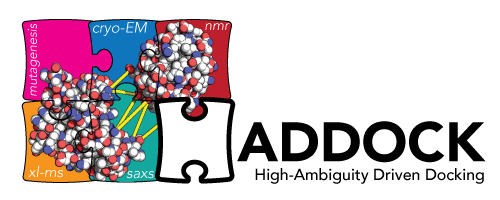This is a website for an H2020 project which concluded in 2019 and established the core elements of EOSC. The project's results now live further in www.eosc-portal.eu and www.egi.eu
This is a website for an H2020 project which concluded in 2019 and established the core elements of EOSC. The project's results now live further in www.eosc-portal.eu and www.egi.eu

HADDOCK (High Ambiguity Driven protein-protein DOCKing) is an integrative platform developed at Utrecht University for the modelling of biomolecular complexes and is one of the WeNMR thematic services operated under the EOSC-Hub project.
In the context of COVID-19 related research, the WeNMR portal has seen an increase of registrations over the last weeks with many users indicating they intend to use it for COVID-19 projects. HADDOCK is also a core software in the BioExcel Center of Excellence and BioExcel has also committed to support COVID-19 researchers. As such, the HADDOCK WeNMR team in Utrecht is already involved in several collaborations. For this purpose, together with EGI/EOSC experts, the team is looking both into expanding the processing capacity of the HADDOCK portals and providing customised solutions to support researchers.
These might take the form of dedicated virtual clusters with a HADDOCK frontend running on EOSC cloud resources, and customised virtual machines (VMs) with ready-to--run local HADDOCK installation for experienced users wanting to use the software at the command line.
More on HADDOCK:
HADDOCK distinguishes itself from other docking methods in the fact that it can use a large variety of experimental and bioinformatics data to drive the docking process. HADDOCK has been offered as a web portal since 2008, freely accessible to non-profit users (wenmr.science.uu.nl) as part of the WeNMR services. HADDOCK is also an integrated service available in the EOSC Marketplace.
Besides the application software, the service also provides automated pre- and post-processing, compute, temporary storage and job scheduling and monitoring for running the application, so that researchers do not need to worry about application porting and compute infrastructure. The portal is heavily used with >15500 registered users from >110 countries (see statistics).
